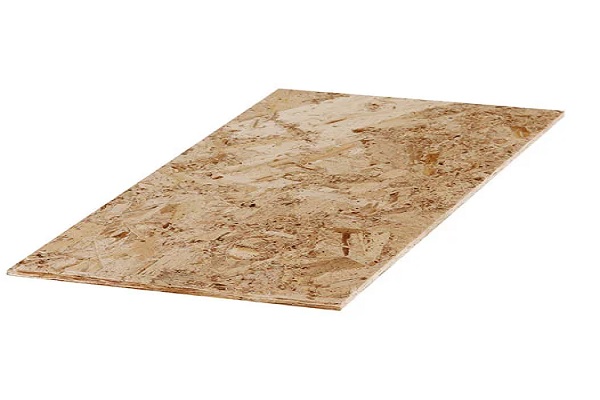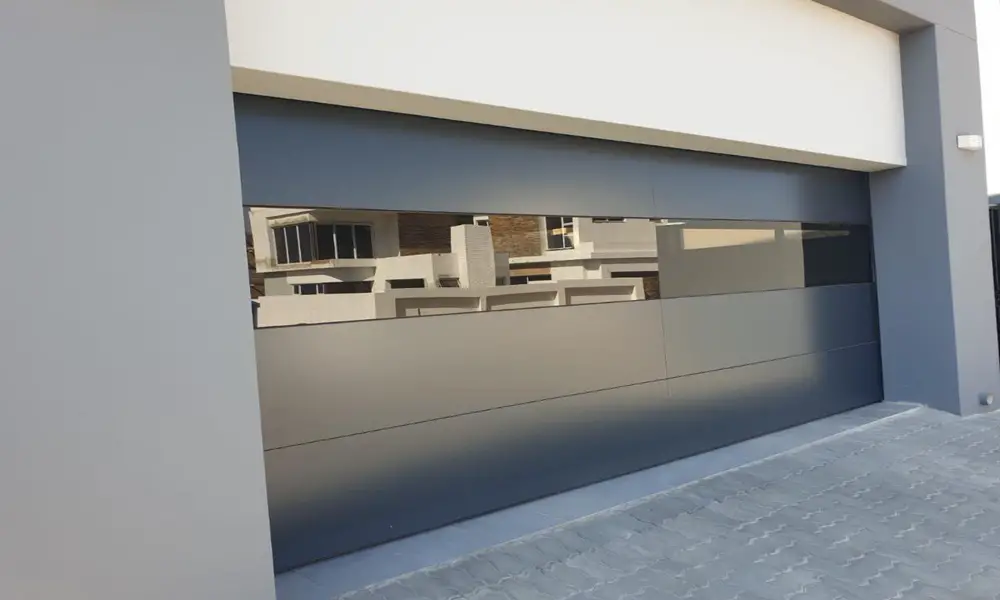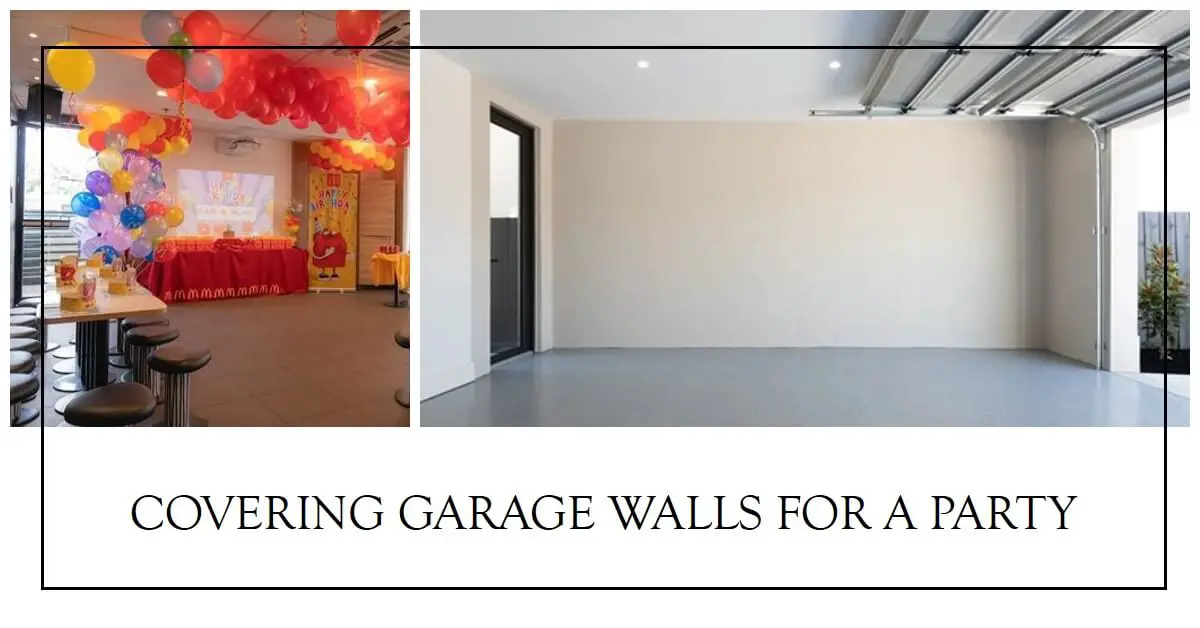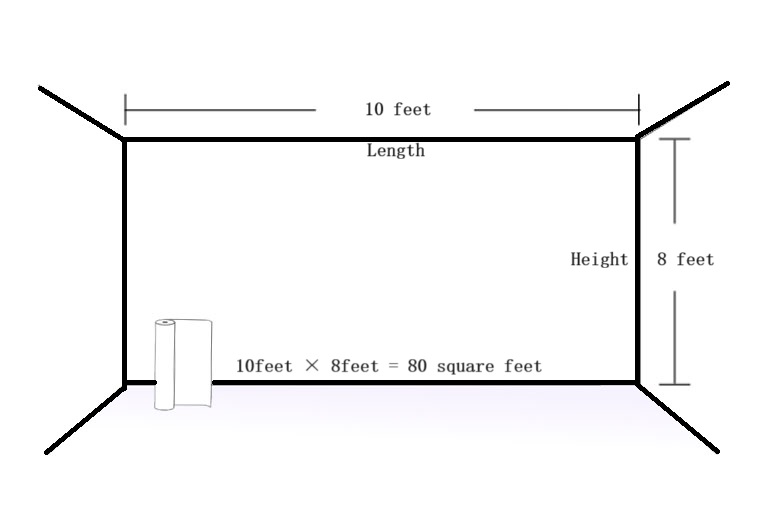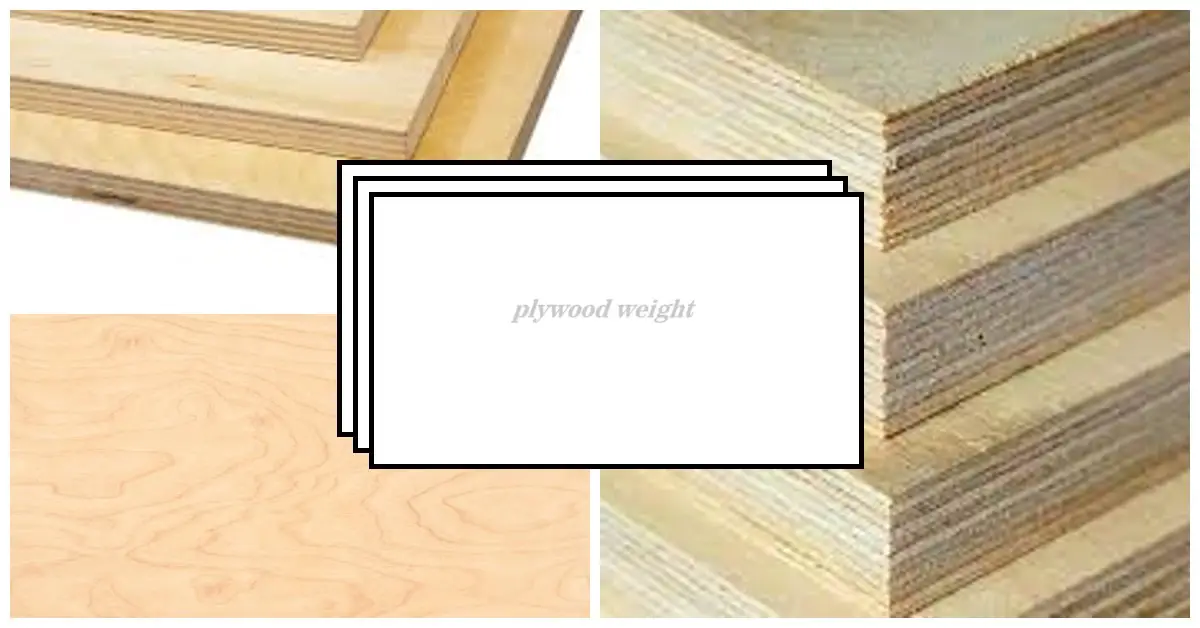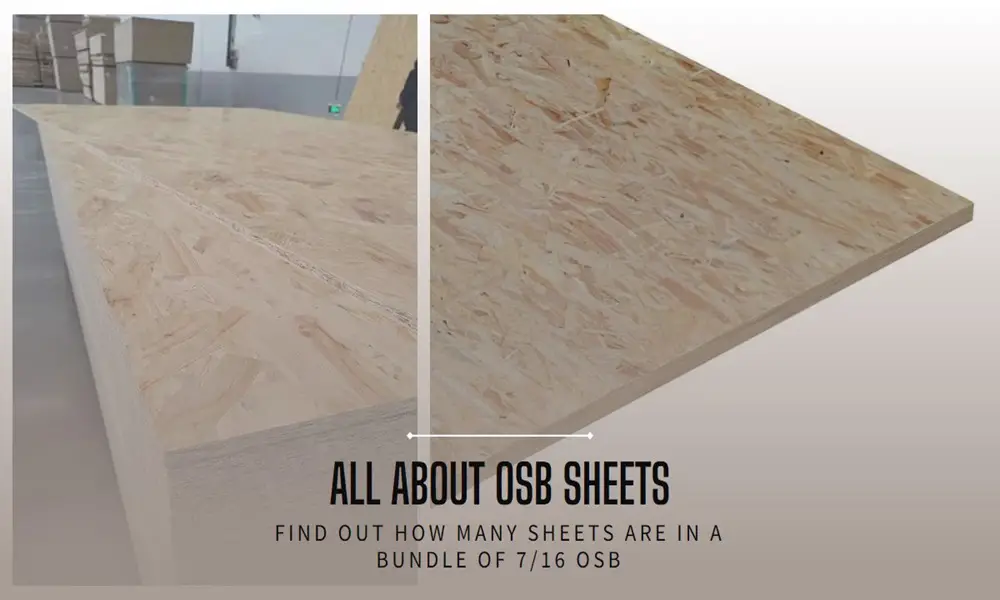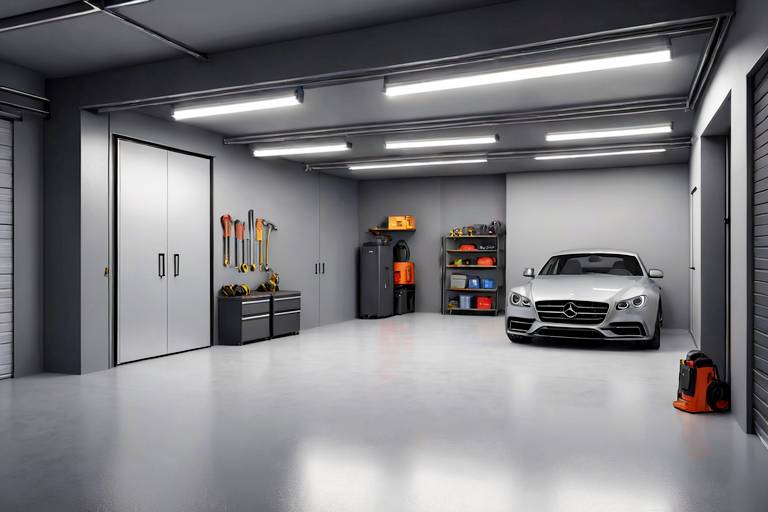Best Material for Garage Walls: Durability and Functionality
When it comes to transforming your garage into a functional and visually appealing space, selecting the right materials for the […]
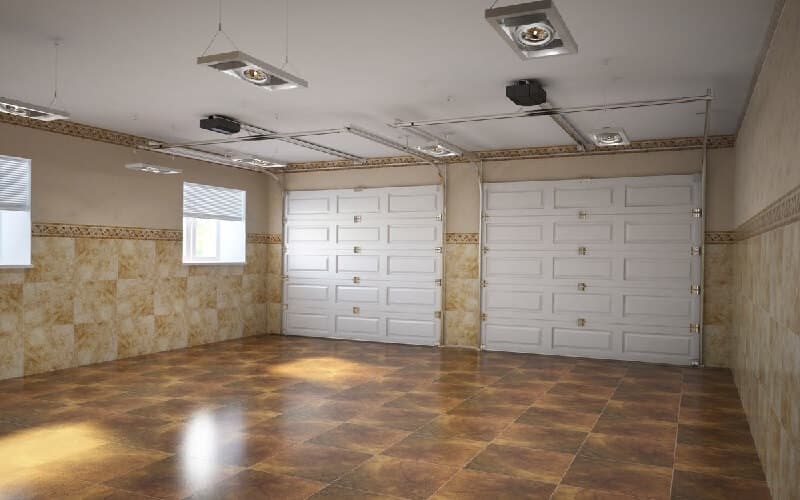
When it comes to transforming your garage into a functional and visually appealing space, selecting the right materials for the walls is crucial.
As someone who has recently undergone a garage renovation project, I understand the importance of choosing materials that offer durability, functionality, and aesthetic appeal.
In this comprehensive guide, I will share my firsthand experience and provide original information, research, and analysis to help you make an informed decision for your own garage renovation or construction project.
Understanding the Importance of Garage Walls
Before diving into the specific materials, it’s essential to understand the importance of garage walls.
These walls serve as a protective barrier, shielding your garage and its contents from external elements.
They not only contribute to the structural integrity of the space but also provide insulation, soundproofing, and privacy.
Garage walls should be able to withstand wear and tear, impacts, and exposure to moisture.
They should complement the overall design theme and purpose of your garage. By choosing the right materials, you can enhance the functionality, durability, and aesthetic appeal of your garage walls.
The 15 Best Material for Garage Walls
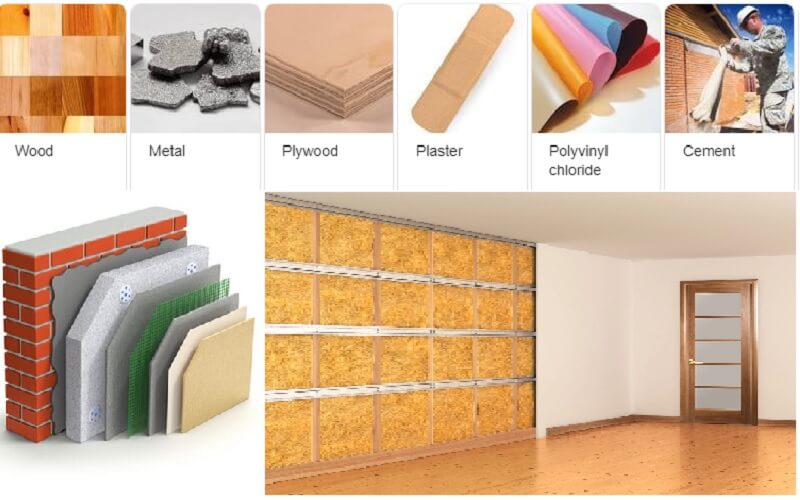
1. Tile
After selecting tiles for my garage walls, I can vouch for their durability, versatility, and aesthetic appeal.
Tile excels at resisting moisture, impact, and stains, making it an ideal choice for garages with high humidity or frequent spills.
The wide range of colors, patterns, and textures available allows me to achieve a stylish, personalized garage look.
I should note that professional installation may be required, and the cost of tiles can be higher than for other materials.
Best Features:
- Excellent durability and resistance to impact
- Waterproof and easy to clean
- Wide variety of colors, styles, and textures are available
- Can enhance the overall aesthetics of the garage
Pros:
- Resistant to moisture, mold, and mildew
- Provides a sleek and modern look
- Highly durable and long-lasting
- Simple maintenance and easy to clean
Cons:
- Installation can be time-consuming and labor-intensive
- Higher upfront cost compared to some other materials
- Tile may crack or chip if heavy objects are dropped on it
2. Wood
If you’re seeking timeless charm and versatility, wood is a fantastic option. It brings warmth and character to your garage while complementing various design styles.
I personally installed wood panels and experimented with horizontal and vertical orientations, creating unique patterns and designs.
It’s worth noting that wood may require regular maintenance, such as sealing and refinishing, to protect it from moisture and prevent warping or rotting.
Best Features:
- Natural warmth and beauty
- Can be painted or stained to match personal style
- Offers good insulation properties
Pros:
- Provides a classic and timeless aesthetic
- Relatively easy to install and repair
- Offers good insulation properties
Cons:
- Prone to moisture damage if not properly sealed
- Regular maintenance is required, such as staining or painting
- Susceptible to scratches and dents
3. Metal
For a modern and industrial aesthetic, I considered metal walls during my garage renovation. Metal panels or corrugated sheets provide excellent durability, fire resistance, and protection against impacts.
Furthermore, they are low-maintenance and resistant to pests and rot.
I discovered that metal walls can be prone to dents and scratches, necessitating insulation to minimize condensation and temperature fluctuations.
Best Features:
- Exceptional strength and durability
- Fire-resistant and resistant to pests
- Low maintenance and easy to clean
Pros:
- Provides a sleek and industrial look
- Highly resistant to moisture, rot, and mold
- Can withstand heavy use and impact
Cons:
- Can be more expensive compared to other materials
- Limited options in terms of colors and styles
- Lacks insulation properties, which may affect temperature regulation
4. Plywood
Opting for plywood was a cost-effective choice that allowed me to achieve a clean and simple look in my garage.
The material provided decent durability and withstood moderate impacts.
I could easily paint or stain the plywood panels to match my desired aesthetic.
It’s crucial to note that plywood is susceptible to moisture damage and may require proper sealing or coating for enhanced resistance.
Best Features:
- Affordable and readily available
- Versatile and easy to work with
- Provides a smooth and clean surface for finishing
Pros:
- Cost-effective solution for garage walls
- Can be painted or stained to suit personal preferences
- Easy installation process
Cons:
- Susceptible to moisture damage if not properly sealed
- Not as durable as other materials, prone to scratches and dents
- Limited visual appeal compared to more decorative options
5. Plaster
To achieve a traditional and elegant look, I considered plaster walls for my garage.
They offer a smooth and seamless finish that can be painted or decorated according to personal preference. Plaster is highly durable and resistant to impacts and fire.
I discovered that the installation process can be labor-intensive, and repairs may be required over time in case of cracks or damages.
Best Features:
- Smooth and seamless finish
- Can be customized with decorative finishes
- Offers good soundproofing properties
Pros:
- Provides a sleek and elegant appearance
- Highly durable and resistant to wear and tear
- Offers good insulation properties
Cons:
- Requires professional installation for optimal results
- A time-consuming process, especially for larger areas
- May crack or chip if subjected to heavy impact
6. Cement
In my quest for unmatched durability and resistance, cement walls proved to be an excellent choice.
They are commonly used in commercial garages or where maximum strength and protection are required.
Cement walls can be left unfinished for an industrial look or painted for a more polished appearance.
I found that professional installation is recommended due to their weight and the time-consuming construction process.
Best Features:
- Exceptional strength and durability
- Resistant to fire, moisture, and pests
- Low maintenance and easy to clean
Pros:
- Provides an industrial and minimalist look
- Highly durable and long-lasting
- Resistant to mold, mildew, and rot
Cons:
- Limited visual variety compared to other materials
- The installation process can be labor-intensive
- Lack of insulation properties, which may affect temperature regulation
7. Vinyl
For those seeking a low-maintenance and moisture-resistant solution, vinyl walls are worth considering.
They are lightweight, easy to install, and available in various colors and textures. Vinyl panels can withstand impacts, resist stains, and require minimal upkeep.
It’s important to note that they may not provide the same level of durability as other materials and can be prone to fading over time.
Best Features:
- Moisture-resistant and easy to clean
- A wide range of colors and patterns are available
- Relatively affordable compared to other options
Pros:
- The simple installation process, suitable for DIY projects
- Resistant to mold, mildew, and stains
- Provides a clean and modern appearance
Cons:
- Not as durable as some other materials
- Prone to scratching and denting
- Limited customization options
8. Fiberboard
To balance affordability and aesthetics, fiberboard, also known as medium-density fiberboard (MDF), caught my attention.
It offers ease of installation and painting, providing a smooth and uniform surface that can be customized with different paint finishes.
While fiberboard is less susceptible to warping and expansion compared to wood, it may not be as durable as some other materials and can be susceptible to moisture damage.
Best Features:
- Smooth and consistent surface
- Can be painted or veneered for a finished look
- Budget-friendly option
Pros:
- Cost-effective solution for garage walls
- Easy to work with and install
- Offers good insulation properties
Cons:
- Susceptible to moisture damage if not properly sealed
- Prone to swelling and warping in humid conditions
- Not as durable as some other materials
9. Shiplap
For a rustic charm with a modern twist, shiplap walls emerged as a popular option during my research.
The horizontal wooden planks create a visually appealing and textured look, suitable for various styles from farmhouse to coastal.
I found that shiplap can be painted or stained to match any desired aesthetic. It’s important to note that like other wood materials, shiplap may require maintenance and protection against moisture.
Best Features:
- Rustic and charming aesthetic
- Provides texture and visual interest
- Easy to install and maintain
Pros:
- Adds a unique and stylish element to the garage
- Durable and long-lasting
- Can be painted or stained to suit personal preferences
Cons:
- Limited design options compared to other materials
- Gaps between boards may allow for moisture penetration
- Requires regular upkeep to prevent warping or rotting
10. Stucco
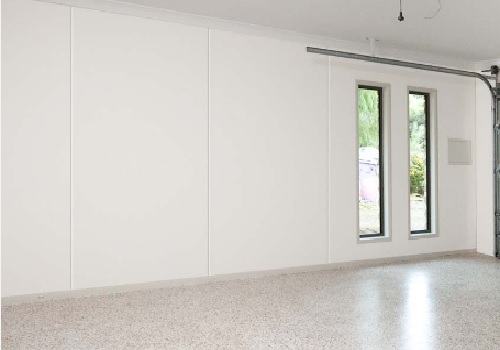
In my pursuit of textured elegance and weather resistance, stucco walls stood out as a fantastic choice.
They can withstand harsh climates, including extreme temperatures and moisture. Stucco provides a seamless and durable finish that can be painted in different colors.
I recommend professional installation for stucco walls, and occasional repairs may be needed to address cracks or damages over time.
Best Features:
- Excellent durability and resistance to impact
- Fire-resistant and low-maintenance
- Provides a textured and decorative finish
Pros:
- Offers a unique and artistic appearance
- Highly durable and long-lasting
- Resistant to rot, pests, and weather damage
Cons:
- Requires professional installation for optimal results
- Limited options in terms of colors and textures
- Difficult to repair if damaged
11. Slatwall
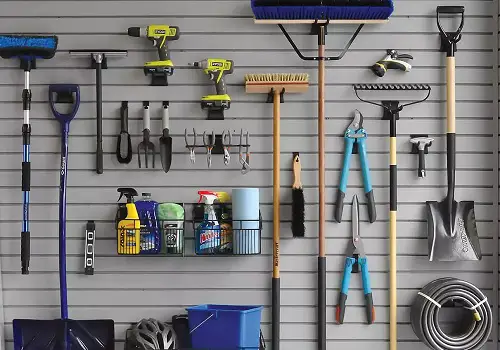
If maximizing storage and organization is a priority, I highly recommend considering slatwall for your garage walls.
Slatwall panels have horizontal grooves that allow for the attachment of hooks, shelves, and other accessories, providing flexibility in arranging and rearranging tools and equipment.
Slatwall is available in various materials, including wood, PVC, and metal, offering different aesthetic options to suit your preferences.
Best Features:
- Versatile and customizable storage solution
- Maximizes vertical space and organization
- Easy to install and reconfigure
Pros:
- Offers convenient storage for tools and equipment
- Flexibility to add or remove hooks, shelves, and baskets
- Enhances the overall organization and functionality of the garage
Cons:
- Higher cost compared to traditional wall materials
- Limited load capacity for heavier items
- May require professional installation for proper support
12. OSB
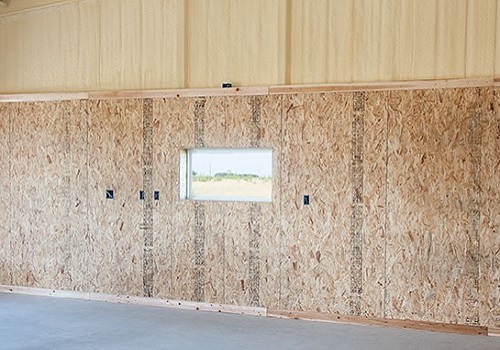
For a budget-friendly option that doesn’t compromise on structural strength, OSB (oriented strand board) impressed me.
Composed of wood strands bonded together with resin, OSB creates a strong and durable panel.
It can be used as a base layer for other wall materials or left exposed for an industrial look.
I found that proper sealing or finishing is necessary to protect OSB from moisture damage.
Best Features:
- Affordable and readily available
- Provides structural strength and stability
- Suitable for a variety of finishes
Pros:
- Cost-effective solution for garage walls
- Offers good insulation properties
- Easy installation process
Cons:
- Prone to moisture damage if not properly sealed
- Not as visually appealing as some other options
- Susceptible to swelling and warping in humid conditions
13. Plastic
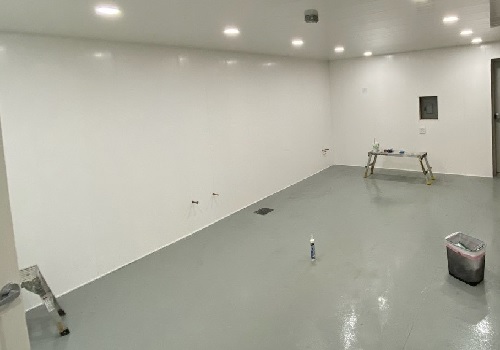
Those seeking a lightweight and affordable solution will appreciate the benefits of plastic walls.
They are easy to install, clean, and resistant to moisture and pests. Plastic panels come in various colors and patterns, allowing for customization.
It’s important to note that plastic may not provide the same level of durability or impact resistance as other materials.
Best Features:
- Moisture-resistant and easy to clean
- A wide range of colors and textures are available
- Lightweight and easy to install
Pros:
- The simple installation process, suitable for DIY projects
- Resistant to mold, mildew, and stains
- Provides a modern and clean appearance
Cons:
- Not as durable as other materials
- Prone to scratching and fading over time
- Limited customization options
14. Glass
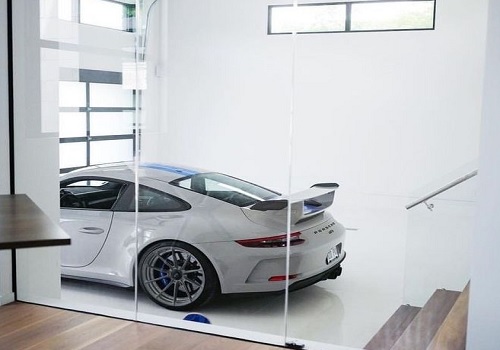
For a sleek and contemporary look that allows ample natural light, glass walls can transform your garage.
Glass panels can be clear, frosted, or tinted, offering privacy options. They are highly durable and resistant to impacts, weather, and temperature fluctuations.
It’s crucial to acknowledge that glass walls can be expensive, requires professional installation, and may lack insulation properties.
Best Features:
- Sleek and modern aesthetic
- Allows natural light to penetrate the space
- Reflects and enhances the overall ambiance
Pros:
- Creates a visually open and spacious environment
- Easy to clean and maintain
- Resistant to moisture and stains
Cons:
- Fragile and prone to breakage
- Limited privacy and insulation properties
- Higher cost compared to other materials
15. Stone
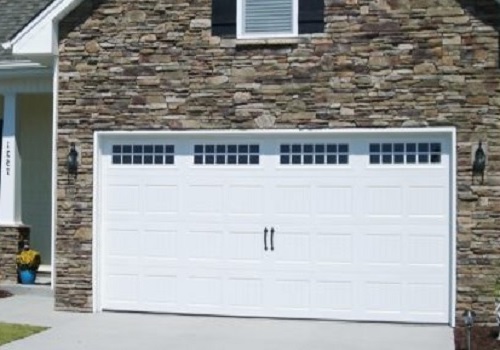
Lastly, stone walls offer timeless elegance and natural beauty, turning your garage into a stunning space. Whether opting for stone veneer or stacked stone panels, the visually striking feature adds texture and depth to the environment.
Stone is highly durable and resistant to impacts and fire. It’s important to consider the expense associated with stone walls and seek professional installation due to their weight and complexity.
Best Features:
- Natural and timeless beauty
- Provides excellent durability and strength
- Enhances the overall aesthetics of the garage
Pros:
- Highly resistant to wear, impact, and weather damage
- Offers excellent insulation properties
- Adds a sense of luxury and sophistication
Cons:
- Expensive compared to other materials
- Heavy and requires proper structural support
- The installation process may be labor-intensive
Factors to Consider When Choosing Garage Wall Materials
When it comes to choosing the perfect material for your garage walls, there are several important factors to consider carefully. Drawing from extensive research, I’ve put together the following information to help you make an informed decision.
Durability and Resistance
One of the primary challenges faced by garage walls is their exposure to various harsh conditions such as impacts, humidity, temperature fluctuations, and potential water exposure.
It is essential to choose a material that exhibits high durability and resistance to ensure longevity and minimize the need for frequent repairs or replacements.
From my own experience, materials like metal or concrete have proven to be excellent choices in terms of durability.
Installation and Maintenance
Another crucial aspect to consider is the ease of installation and maintenance. Some materials may require professional installation or specialized tools, while others can be easily installed as a rewarding do-it-yourself (DIY) project.
Taking into account your own skill level and the amount of time you’re willing to invest in the installation process can help you determine the most suitable material for your garage walls.
In terms of maintenance, materials like vinyl or fiberglass are relatively low-maintenance and can save you valuable time and effort.
Cost and Budget
Budget plays a significant role in any home improvement project, and choosing garage wall materials is no exception.
While some materials may appear more affordable upfront, it is crucial to consider the long-term costs and benefits.
Striking the right balance between cost, durability, and aesthetics is key. From my research, I’ve found that materials like plywood or drywall offer a good balance between cost-effectiveness and durability.
Read Also:
Aesthetic Appeal
Gone are the days when garages were merely utilitarian spaces devoid of style. Nowadays, homeowners consider their garages as an extension of their overall home design, aiming for a cohesive look and feel.
When choosing garage wall materials, it’s important to consider the aesthetic appeal and select a material that complements the desired style and theme. For a sleek and modern look, materials like stainless steel or aluminum can be excellent choices.
On the other hand, if you prefer a more traditional or rustic feel, materials like wood or stone veneer can add a touch of warmth and charm to your garage space.
Conclusion
In conclusion, the process of choosing the best material for garage walls is a crucial step in creating a space that is both functional and visually pleasing.
Throughout my personal experience and research, I have discovered that several key factors should be taken into consideration.
Durability is of utmost importance when it comes to garage walls. The material you choose should be able to withstand the wear and tear of daily use, impacts, and potential exposure to moisture.
Ensuring that your walls can endure these challenges will save you from frequent repairs or replacements in the long run.
Installation ease and maintenance requirements are also crucial aspects to consider. From my own experiences, I have found that some materials, like tile and metal, may require professional installation due to their intricacies.
On the other hand, options like plywood and vinyl offer simpler installation processes that can be tackled as DIY projects. It’s important to consider your own skill level and the time you are willing to invest in the installation process.
